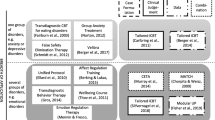Abstract
I wish to formulate in broad outline an approach to the conceptualization of psychoanalysis that is divested from theory. This view sees the core of psychoanalysis as a humanistic practice, first and foremost guided by the individuality of the dyadic encounter, rather than as a science. I will not argue for any particular view of psychoanalysis. Instead I marshal a series of considerations from the humanities, to frame a conceptualization of psychoanalysis as a clinically based interpretive discipline having a unique mission. Finally, I will present a futuristic hypothetical scenario whose aim is to show why psychoanalysis will remain a viable enterprise basically as conceived by Freud.
Similar content being viewed by others
References
Barnett, J. (1966). A structural analysis of theories in psychoanalysis. Psychoanalytic Review, 53A, 85–98.
Freud, S. (1953[1900]). The interpretation of dreams. Standard Edition (Vol. 4, pp. 574–576), J. Strachey (Trans.). London: The Hogarth Press.
Freud, S. (1953[1912]). Recommendations to physicians practicing psycho-analysis. Standard Edition (Vol. 12, pp. 111–112), J. Strachey (Trans.). London: The Hogarth Press.
Gadamer, H. (1986). Truth and method. second rev. J. Weinsheimer and D.G. Marshall (Ed. & Trans.), (p. 473). New York: Continuum.
Guntrip, H. (1967). The concept of psychodynamic science. International Journal of Psychoanalysis, 48, 32–43.
Hegel, G. (1971[1830]). Hegel's philosophy of mind. W. Wallace (Trans.). Oxford: Clarendon Press (p. 396). This is a translation of the third volume of Hegel's Encyclopedia.
Heidegger, M. (1927). Being and time, J. Macquarrie & E. Robinson (Trans.). San Francisco, CA: Harper San Francisco, A Division of Harper Collins, 1962.
Heidegger, M. (1953). Introduction to metaphysics, R. Manheim (Trans.) (1959) New Haven, CT: Yale University Press.
Horney, K. (1937). The neurotic personality of our time. New York: Norton.
Horney, K. (1939). New ways in psychoanalysis. New York: Norton.
Kant, I. (1781). Critique of pure reason, N.K. Smith (Trans.). New York: St. Martin Press, 1965.
Nietzsche, F. (1998[1886]). Part one: On the prejudices of philosophers. M. Faber (Trans.), Beyond good and evil (#14, p. 15). Oxford: Oxford University Press.
Nietzsche, F. (1968). The will to power (new ed.) W. Kaufman (Trans.) (1968). New York: Vintage Books.
Purcell, S.D. (2004). The analyst's theory. International Journal of Psychoanalysis, 85, 634–652.
Reeder, J. (2004). Narrative as a hermeneutical relationship to the unconscious. Scandinavian. Psychoanalytic Review, 27, 119.
Schafer, R. (1973). Action: Its place in psychoanalytic interpretation and theory. The Annual of Psychoanalysis, 1, 165.
Schafer, R. (1980). Action language and the psychology of the self. The Annual of Psychoanalysis, 8, 83–92.
Wittgenstein, L. (1921). Tractatus logico-philosophicus. D.F. Pears & B.F. McGuinness (Trans.) (1974). London and Henley: Routledge & Kegan Paul.
Wittgenstein, L. (1953). Philosophical Investigations (third edition), G.E.M. Anscombe (Trans.). New York: Macmillan Publishing Company, 1968.
Author information
Authors and Affiliations
Additional information
1Clinical Associate Professor (Retired), Department of Medicine, Weill Medical College of Cornell University, New York City.
Rights and permissions
About this article
Cite this article
Appelbaum, J. Should Psychoanalysis Become a Science?. Am J Psychoanal 71, 1–15 (2011). https://doi.org/10.1057/ajp.2010.31
Published:
Issue Date:
DOI: https://doi.org/10.1057/ajp.2010.31




